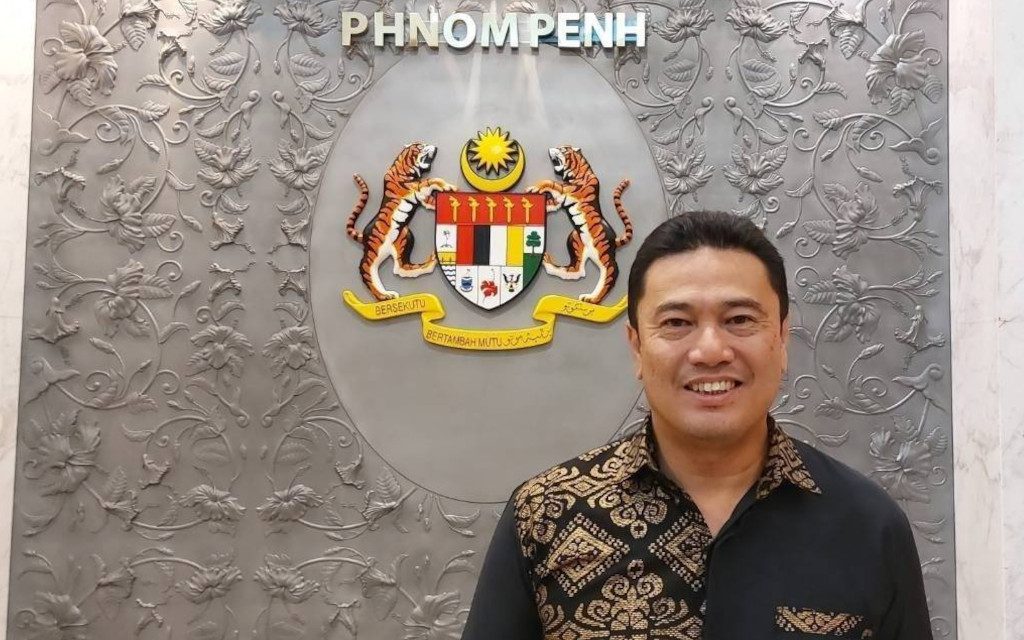Compared to Chinese, Thai and Vietnamese nationals, there have been fewer raids freeing Malaysian nationals from alleged scam operations in Sihanoukville, Phnom Penh and border areas. However, Malaysian ambassador Eldeen Hasaini Mohd Hashim recognized this as a persistent problem for citizens brought into Cambodia, explaining Malaysia’s efforts to cooperate with authorities and investigate masterminds behind scam businesses. The ambassador met with VOD reporter Danielle Keeton-Olsen to discuss the labor issues surrounding online gambling and scam work in Cambodia, the shifting nature of worker recruitment and diplomatic approaches to addressing the issue.
What has the Malaysian Embassy done to assist with some of these rescues?

This is a very long, long issue, it has been going since I arrived. … We work closely with the Cambodian authority basically because it is our job as the embassy to take care of the welfare of Malaysians. … We can’t do it alone. If we try to do it alone, I don’t think we can be successful. What we did is we have some collaboration with a few related agencies, of course we start with [Cambodia’s] Ministry of Foreign Affairs and Ministry of Interior, and from there we get along with police special forces and that extends to the governor and representatives in the province. How we work is we establish connection [with a Malaysian national inside the compound] first, we don’t go straight away without asking help, we establish connection, we offer also what we can to help them.
Of the rescues you’ve made, have you noticed a difference between those rescued before the Covid-19 pandemic and after?

In 2019 we can see cases, a lot of cases. … I can have maybe one or two [rescues at a time] maybe with two or three people, and then Covid came [with restrictions] at this time, nobody can come in, there were no people getting trapped by this online gambling.
And then when Cambodia started to open borders, then you can see the hike. Then it just becomes, now up to 16 [rescued at one time], and we have another 15 we need to rescue. During the [epidemic] of Covid, Cambodia opened really fast and we can see the trend of people coming in … when we rescue most of them, and you look at their date of entry [on their passports], it’s only from January or December [2020], so it’s very, very early.
When you rescue someone or take one of these cases, what kind of information are you asking from them?

We need to do our investigation because we know that … they come in groups so we know that one of them will be the ringleader. We know one of them will be the informer, because this is the trend. We’ve been doing this since 2019, even before [my ambassadorship started in 2019], we know the trend that there will be one who will go along with the Malaysians who have been rescued just to make sure that they won’t talk. Of course all of them have been coached — if you are caught this is what you should say this is what you should not say. So we know we do a two-hour investigation, our technical investigation, we got to know some of them are the informers or recording leaders. With that information, we share with our special branch police officer in Malaysia, so once we transfer them to KLIA [Kuala Lumpur International Airport], they will be immediately taken by the police for the investigation, and from there we just have a strategy to catch … the bigger fish.
Is there evidence that scam workers [in Cambodia] are scamming Malaysian nationals [in your country]?

The modus operandi of getting Malaysians or Thais or whoever, it’s just because they can speak the language, because Malaysians about 17% are [ethnically] Chinese, so they can [be used to] scam Chinese [speakers] so they come to Cambodia. But now they have a new trend where they are attracting people other than the Chinese. They now engage with the Indians or the Malays [ethnic groups] … to come to work.
[The scam operations’ bosses] are very specific and they’re very organized. If they’re Thai, they will take the Thais to talk to the Thais, they won’t take the Chinese to talk to the Thais. But because the ringleaders are paid well, so they don’t care about whatever [a scam worker’s] nationality is. They have their own quota or KPI [key performance indicator], they need to reach their target, if they don’t reach the target they’re screwed, so they’re doing more and more to reach their goals.
Are you still seeing a lot of cases of people saying trafficked or tortured?

In terms of being tortured or whatnot, it’s less. Before Covid we did receive a few who have been tortured, even we have one or two come to embassy, we protected them. But nowadays … there’s no more torture.
I think one is because these people knew if they torture they’d have a more serious problem. Rather than if they are caught doing the online gambling, then [authorities] just take the people and give a lesser sentence, rather than if you beat up a guy and beat them until death you go to prison or a higher sentencing, so we can see that trend is no longer there. I assume there is still [torture] but not so severe compared to last time [before Covid-19].
Local officials have been trying to downplay these cases to the media … has your experience with provincial police reflected [a decrease] as well?

If you compare to the past, yes, because at the end of 2019 the prime minister announced a ban on online gambling, then there was a massive shift, 90,000 of them moved back to China. There was a tsunami[-sized] move out and everyone was happy. But it was very tricky, after doing that [online gambling and fraud] became active again and again and it became bigger and bigger. So in a way yes we can say that if you compare to that [period], there was a decrease in terms of people being shifted out, but in terms of people getting scammed, there was an increase not a decrease.
It’s just that now they’re more clever, they’re more coordinated. It’s very difficult for you to define scam, online gambling or illegal online gambling because Sihanoukville is all casinos, and if you go on the pretext of these people have been offered and they agreed under contract as a casino worker, then it’s all legal, but this is all [on] paper. Then you can’t really raid on the casino and say, ‘Look I’m taking the Malaysians back because this is an online scam.’ They say this is not an online scam, this is a casino, they have the contract and they have the [rescued person’s] name on it. But then you have to remember the one who signed has either been forced or influenced or they don’t know what they’re signing. Now they’re more organized so it’s very difficult in terms of getting into it, but we know the trend now … and then we work with the Cambodian authorities and say this is how we’re going to do it and it’s been successful.
From a diplomatic side, will Malaysia or Asean put pressure on Cambodia to cut down on these compounds?

I think bilaterally we do, each individual country has raised concerns with the Cambodian side. Whether it is from ambassador level or minister level, I think there is a concern that we raise. I think for Malaysia, they raised in terms of security issues, but we offer collaboration and solutions, we don’t really tell them what to do. But what we do is we assist them and guide them on how to do it because we’re also having the same problems so we exchange ideas and exchange information. I think that would be more practical. So yes, the answer is yes. We do raise concerns bilaterally, and I think it has been discussed under the security umbrella by Asean.
On the bilateral side, what kind of security assistance has Malaysia offered before?

We are good at cybercrime and cybersecurity so we are helping them and hopeful we can sign at least one MoU on cybersecurity with Cambodia. We also have expertise in terms of cyberwar, cyberwarfare, I think Malaysia is one of the leading countries that have this kind of expertise. Cambodia has agreed to let us have this collaboration, we are [in] ongoing talks on this and hopefully we can sign this [MoU] at the end of this year, early next year.
Of the 16 [recently rescued], you said you found one informant. How do you tell who is the ringleader?

We have stages of investigation. So first with the Cambodian side we got some information from that and on through the Chinese [authorities] and on through us. It’s very easy for you to get the ringleader because you just have to separate them and talk to all of them individually, So some people will just talk and show us who it is, and it’s very obvious because you have to remember, because this group is an average group [of workers], they’re not very blue-collar crime or know how to stand or sit or control their body language. It’s just the typical people who work on a daily basis, and they don’t have these skills. We have the skills to see your body language, the way you talk to us, the way you control the crowd. We have our own specific techniques on how you can trace and most of the time we caught them.
Do you see any possibility of Malaysia working with Cambodia or Aseanapol to find out who these big bosses are?

I think they are doing an investigation but unfortunately I don’t have the liberty of getting the info. When we discussed, everything sent to us was still under investigation and if we talk to anyone we will then disturb the investigation. But I do believe that there is greater cooperation among us because this is any issue which concerns everyone.
Anything else you want to add?

If your readers want to know about this, it’s always encouraging if you can share how [online fraud businesses] work so people don’t get scammed anymore. It’s important for us to share information and expose all of them because this is a trend we need to do nowadays, I think before many didn’t want to stand up because they don’t know the issue or they’re scared. … We use media as a tool to warn other Malaysians or other nationalities to get into this kind of scam because it’s very easy for them to do before because nobody speaks up. Now because everybody speaks up about it and it’s been published in the media, they get scared and now they have to seek other things and other ways to do it. I don’t think it’s going to stop but I think it’s going to be difficult for them to get more victims.
Note: Answers have been condensed and edited for clarity.













